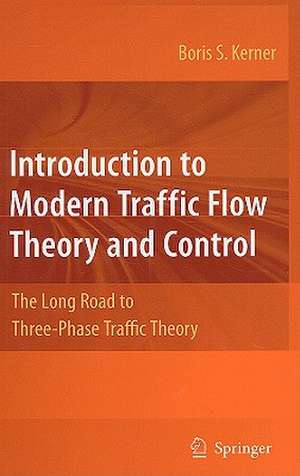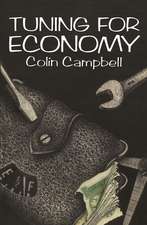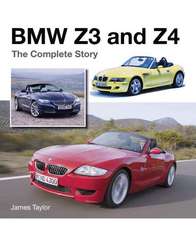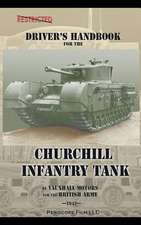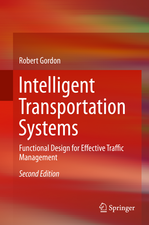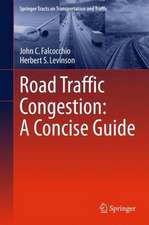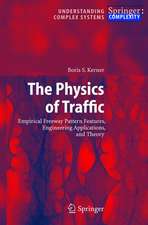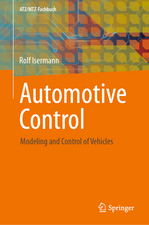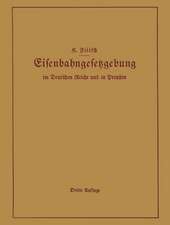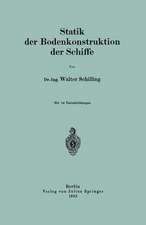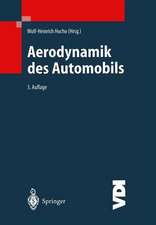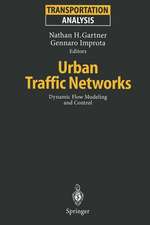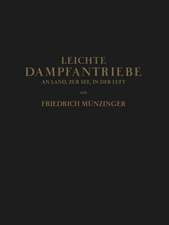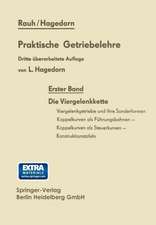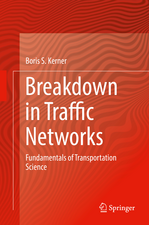Introduction to Modern Traffic Flow Theory and Control: The Long Road to Three-Phase Traffic Theory
Autor Boris S. Kerneren Limba Engleză Hardback – 28 sep 2009
| Toate formatele și edițiile | Preț | Express |
|---|---|---|
| Paperback (1) | 626.65 lei 6-8 săpt. | |
| Springer Berlin, Heidelberg – 31 oct 2014 | 626.65 lei 6-8 săpt. | |
| Hardback (1) | 632.73 lei 6-8 săpt. | |
| Springer Berlin, Heidelberg – 28 sep 2009 | 632.73 lei 6-8 săpt. |
Preț: 632.73 lei
Preț vechi: 744.39 lei
-15% Nou
Puncte Express: 949
Preț estimativ în valută:
121.11€ • 126.99$ • 100.07£
121.11€ • 126.99$ • 100.07£
Carte tipărită la comandă
Livrare economică 29 ianuarie-12 februarie 25
Preluare comenzi: 021 569.72.76
Specificații
ISBN-13: 9783642026041
ISBN-10: 3642026044
Pagini: 280
Ilustrații: XIII, 265 p.
Dimensiuni: 155 x 235 x 28 mm
Greutate: 0.57 kg
Ediția:2009
Editura: Springer Berlin, Heidelberg
Colecția Springer
Locul publicării:Berlin, Heidelberg, Germany
ISBN-10: 3642026044
Pagini: 280
Ilustrații: XIII, 265 p.
Dimensiuni: 155 x 235 x 28 mm
Greutate: 0.57 kg
Ediția:2009
Editura: Springer Berlin, Heidelberg
Colecția Springer
Locul publicării:Berlin, Heidelberg, Germany
Public țintă
Professional/practitionerCuprins
Three-Phase Traffic Theory.- Definitions of The Three Traffic Phases.- Nature of Traffic Breakdown at Bottleneck.- Infinite Number of Highway Capacities of Free Flow at Bottleneck.- Nature of Moving Jam Emergence.- Origin of Hypotheses and Terms of Three-Phase Traffic Theory.- Spatiotemporal Traffic Congested Patterns.- II Impact of Three-Phase Traffic Theory on.- to Part II:Compendium of Three-Phase Traffic Theory.- Freeway Traffic Control based on Three-Phase Traffic Theory.- Earlier Theoretical Basis of Transportation Engineering: Fundamental Diagram Approach.- Three-Phase Traffic Flow Models.- Linking of Three-Phase Traffic Theory and Fundamental Diagram Approach to Traffic Flow Modeling.- Conclusions and Outlook.
Recenzii
From the reviews:
“Three-phase theory must be taken seriously, and traditional analysis by traffic engineers should be revised. I hope the book will encourage the traffic research community to employ the concepts and methods that Kerner has so convincingly presented. … Concepts are clearly illustrated with figures, and the book’s useful glossary of traffic terminology should make the material accessible to graduate students in physics, mathematics, and engineering. … I highly recommend Introduction to Modern Traffic Flow Theory and Control.” (L. Craig Davis, Physics Today, March 2010)
“The book brings together the various paper publications by Kerner and his coauthors in a concise and readable manner. … He provides the reader with a set of models that follow three-phase theory and can be used in traffic simulators. I would like to recommend this book by Boris Kerner and like to encourage our community to make use of his models (and theory) in future studies on traffic control.” (Hannes Hartenstein, IEEE Vehicular Technology Magazine, September, 2010)
“This book contains and illustrates a qualitative theory of traffic flow based on three-phase traffic flow models which were introduced by the author and some coauthors in a long series of papers and experiments. … Interested readers can be recommended to start reading this book … .” (Hartmut Noltemeier, Zentralblatt MATH, Vol. 1189, 2010)
“Three-phase theory must be taken seriously, and traditional analysis by traffic engineers should be revised. I hope the book will encourage the traffic research community to employ the concepts and methods that Kerner has so convincingly presented. … Concepts are clearly illustrated with figures, and the book’s useful glossary of traffic terminology should make the material accessible to graduate students in physics, mathematics, and engineering. … I highly recommend Introduction to Modern Traffic Flow Theory and Control.” (L. Craig Davis, Physics Today, March 2010)
“The book brings together the various paper publications by Kerner and his coauthors in a concise and readable manner. … He provides the reader with a set of models that follow three-phase theory and can be used in traffic simulators. I would like to recommend this book by Boris Kerner and like to encourage our community to make use of his models (and theory) in future studies on traffic control.” (Hannes Hartenstein, IEEE Vehicular Technology Magazine, September, 2010)
“This book contains and illustrates a qualitative theory of traffic flow based on three-phase traffic flow models which were introduced by the author and some coauthors in a long series of papers and experiments. … Interested readers can be recommended to start reading this book … .” (Hartmut Noltemeier, Zentralblatt MATH, Vol. 1189, 2010)
Textul de pe ultima copertă
This in-depth treatment explains the nature of traffic breakdown and the resulting congestion in vehicular traffic on the basis of three-phase traffic theory, in a manner consistent with real measured traffic data. The author also addresses freeway traffic control methods within the framework of the theory. He demonstrates and explains why the earlier theoretical basis of transportation engineering, research and teaching cannot adequately describe traffic breakdown as observed in measured traffic data. Links between three-phase traffic theory and earlier traffic flow theories are discussed. Last but not least, the book provides a new fundament for transportation engineering, in particular highway traffic management, as well as the background needed to research the complex system dynamics in traffic flow and transportation networks. It will appeal to students, engineers, and physicists interested in transportation systems and complex dynamical systems in general.
Caracteristici
Includes supplementary material: sn.pub/extras
